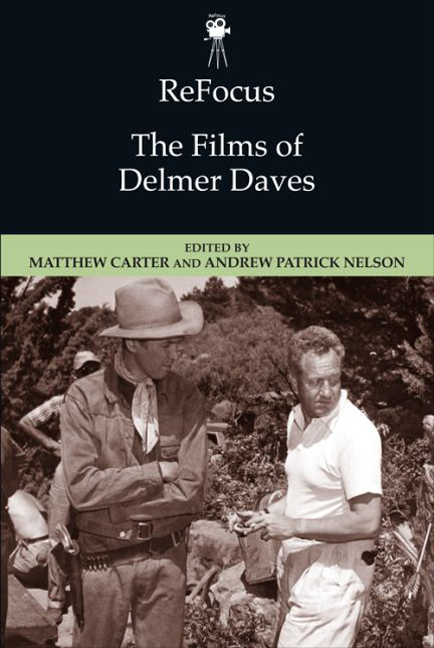Book contents
- Frontmatter
- Contents
- List of Figures
- Notes on Contributors
- Acknowledgments
- Introduction: “No One Would Know It Was Mine”: Delmer Daves, Modest Auteur
- 1 Don't Be Too Quick to Dismiss Them: Authorship and the Westerns of Delmer Daves
- 2 Trying to Ameliorate the System from Within: Delmer Daves’ Westerns from the 1950s
- 3 Bent, or Lifted Out by Its Roots: Daves' Broken Arrow and Drum Beat as Narratives of Conditional Sympathy
- 4 This Room is My Castle of Quiet: The Collaborations of Delmer Daves and Glenn Ford
- 5 Delmer Daves, Authenticity, and Auteur Elements: Celebrating the Ordinary in Cowboy
- 6 Home and the Range: Spencer's Mountain as Revisionist Family Melodrama
- 7 Delmer Daves’ 3:10 to Yuma: Aesthetics, Reception, and Cultural Significance
- 8 Changing Societies: The Red House, The Hanging Tree, Spencer's Mountain, and Post-war America
- 9 Partial Rehabilitation: Task Force and the Case of Billy Mitchell
- 10 “This Is Where He Brought Me: 10,000 Acres of Nothing!”: The Femme Fatale and other Film Noir Tropes in Delmer Daves’ Jubal
- Index
6 - Home and the Range: Spencer's Mountain as Revisionist Family Melodrama
Published online by Cambridge University Press: 15 September 2017
- Frontmatter
- Contents
- List of Figures
- Notes on Contributors
- Acknowledgments
- Introduction: “No One Would Know It Was Mine”: Delmer Daves, Modest Auteur
- 1 Don't Be Too Quick to Dismiss Them: Authorship and the Westerns of Delmer Daves
- 2 Trying to Ameliorate the System from Within: Delmer Daves’ Westerns from the 1950s
- 3 Bent, or Lifted Out by Its Roots: Daves' Broken Arrow and Drum Beat as Narratives of Conditional Sympathy
- 4 This Room is My Castle of Quiet: The Collaborations of Delmer Daves and Glenn Ford
- 5 Delmer Daves, Authenticity, and Auteur Elements: Celebrating the Ordinary in Cowboy
- 6 Home and the Range: Spencer's Mountain as Revisionist Family Melodrama
- 7 Delmer Daves’ 3:10 to Yuma: Aesthetics, Reception, and Cultural Significance
- 8 Changing Societies: The Red House, The Hanging Tree, Spencer's Mountain, and Post-war America
- 9 Partial Rehabilitation: Task Force and the Case of Billy Mitchell
- 10 “This Is Where He Brought Me: 10,000 Acres of Nothing!”: The Femme Fatale and other Film Noir Tropes in Delmer Daves’ Jubal
- Index
Summary
Though successful upon its release in 1963, Spencer's Mountain has very little, if any, reputation to speak of today. Two main explanations jump to the fore, both encapsulated by a set of polarities between which the film is stranded. On the one hand, it lacks the moral value (or moralizing didacticism, depending one's perspective) of its source novel of the same title by Earl Hamner, Jr.; nor does it flaunt the crowd-pleasing buoyancy of The Waltons, the TV series adapted from the same source. Caught between a literary and televisual iteration, Delmer Daves’ Spencer's Mountain stands out even more conspicuously by taking as its setting the Grand Teton Mountains of Wyoming rather than the backwoods of the Virginian Appalachians of the other two versions. On the other hand, the film seems to have fallen through the cracks by fitting neither within the melodramatic mode with which it is ostensibly aligned, nor within the genres with which film critics generally associate Delmer Daves. Indeed, though Spencer's Mountain takes place in a landscape of the great American West that is familiar territory for Daves, it is arguably his only family melodrama.
An overdue re-evaluation of Spencer's Mountain, which this chapter seeks to enact, depends upon unsettling these assumptions about both the film's adherence to melodrama and Daves’ relationship with that narrative mode. In fact, one of the main reasons why critics may not have canonized Daves as a major auteur in the 1960s is that, despite his reputation primarily as a director of Westerns, he actually did often delve into the melodramatic mode. This was a mode entirely out of fashion amongst auteurists, who preferred the coarse masculinity of a John Ford or Raoul Walsh. This aversion to melodramatic excess in fact continues to be an impediment to Daves’ critical appreciation today. Indeed, on a certain level, Spencer's Mountain typifies what Christine Gledhill sees as the reason behind the mode's low critical estimation: “melodrama could offer neither the thematic and evolutionary coherence exhibited by, say, the western, nor sufficient cultural prestige … condemned as it was by association with a mass and, above all female, audience.”
- Type
- Chapter
- Information
- ReFocus: The Films of Delmer Daves , pp. 135 - 148Publisher: Edinburgh University PressPrint publication year: 2016

